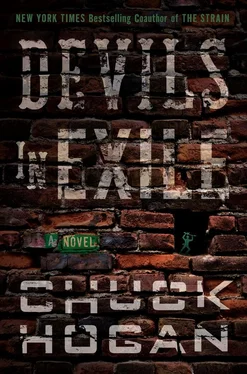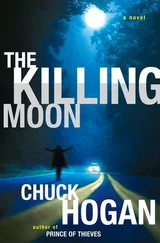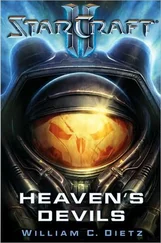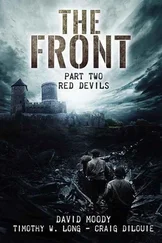The job had cost Lash his marriage, and any shot at a normal American life, which was never really what he’d wanted anyway. Vietnam had pretty well cured him of that. He liked action. He was used to action. He had never sought a desk job, and a street agent’s pay grade could rise only so high. But what he did get was more pull. He got some sway. That was his reward for longevity. That was how he came to head up Windfall.
Windfall was a multiagency task force set up under his command. Cartels and drug rings had a unique problem, one Lash had come to appreciate over his career: they made too much money. Too much cash, specifically, which they then had to devise ingenious ways of getting out of the United States, requiring almost as much energy as did importing their contraband. If the average wholesale price of a kilo of cocaine equaled $30,000, that’s three hundred Benjamins going the other way, taking up as much volume as the drug, if not quite as much mass. With heroin, it’s double the dough, so now you’re moving two to one exports to imports. With the drug cartels each grossing tens of billions every year, and the United States far and away their largest market, that meant $100 billion a year in cash flowing out of this country.
Some of this they accomplished with shell corporations and paper transactions. Some of the money they “smurf” out. Smurfing means breaking down large sums into smaller chunks of less than $10,000, to avoid federal Currency Transaction Report filings. Smurfs are locals who move from bank to bank, depositing cartel money in accounts opened under various aliases, or else converting it into cashier’s checks and post office money orders under the CTR limit. For this, they earn one or two cents on the dollar.
Eighteen months ago, Lash and his team — which included rotating agents on loan from the U.S. Treasury (IRS and FinCEN, the Financial Crimes Enforcement Network), U.S. Customs and Border Protection, Department of Homeland Security (U.S. Citizenship and Immigration Services), U.S. Secret Service (Investigative Support for Money Laundering), Massachusetts State Police, Rhode Island State Police, and Boston and Providence police departments — stopped a husband and wife outside their Methuen home. They were in their fifties, which trended old, but otherwise they fit the profile: neatly dressed, inconspicuous, law-abiding foreign nationals from Mexico, Central America, or northern South America (in this case, Guatemalans), with good language skills, established in the community (their daughter was enrolled in a Catholic high school, and they had a one-year renter’s agreement on their house). Smurfs are rarely armed, notably compliant, and never see or handle the powder: the money cells and the drug cells are kept entirely separate, for security reasons.
The woman carried a large Vera Bradley knockoff — the fashion among New England — area smurfs that year, thanks to its convenient interior pockets — so full of money, she had to remove banded stacks of cash to dig out her identification. Inside their home, in oversize blue cotton laundry bags next to the basement washer-dryer, Lash had discovered another three hundred K.
No law, federal or local, prohibits people from keeping $300,000 in the laundry area of their home. Because of this, Windfall’s arrest rate — their total “clearance” of successfully prosecuted cases — was relatively low. To prefer federal charges, Lash had to prove that a suspect was “structuring” — laundering illegal profits into unreportable sums — which required a significant paper trail, the lack of which was the whole idea of smurfing in the first place. The smurfs who were arrested almost never cooperated with the government, knowing that family members in their native country would suffer for their betrayal. (This was also why smurfs could be trusted never to skim profits from their cartel employers.)
But large sums of money suspected to be the fruit of illegal activity could lawfully be confiscated by the federal government and held until such time as the possessor could prove it was legitimately received or earned. The couple in this case offered no objection to the cash seizure, only requesting a receipt for the full amount, certified by an agent of the IRS: a piece of paper citing proof of law enforcement confiscation, the one thing that ensured they and their loved ones would remain alive.
Such moneys are never claimed, the bulk of the funds turned over to the Treasury’s forfeiture fund to be applied toward reducing the federal deficit — with 10 percent recycled back into financing Windfall. Over the past two years, Windfall had confiscated over $31 million in cash and assets in the six New England states. Because Windfall was self-funded and, in this way, self-perpetuating, Lash and his team enjoyed relative autonomy.
Going after the drugs themselves was a failure. It meant agents had to hustle harder than street dealers to make a bust, only to see the bad guys cycle through the criminal justice system as easily as the dollars they laundered. Street money was chump change, because once the product was out on the streets, the source money, the real money, had already been made.
Disrupt the Flow. That was Lash’s mantra. Get in Their Shit. The money Windfall had seized wasn’t enough to shake the foundations of the cartels — not yet — and admittedly, drugs weren’t physically being taken off the street. But Windfall’s diligence was beginning to exact a real toll on the suppliers, Lash was sure. They could always manufacture more product, but confiscated profits were gone forever. He was hacking away at their bottom line. Getting Windfall implemented nationwide, which was his goal, might even change the face of the American drug problem — not defeat it, never defeat it, but weaken it, break it down, make it more manageable.
Lash pulled into a space on the third level of the parking garage. He exchanged his overcoat and coffee-and-cream scarf for a San Antonio Spurs hoodie. He used to wear a Celtics hoodie, but too many whites came up asking if he was Robert Parish.
He crossed into the adjacent Museum of Science, paid the entrance fee, and headed over to the blue wing, second level, past the “Seeing Is Deceiving” exhibit. He slowed a moment there, recognizing two M. C. Escher works: the hand drawing the hand, and the stairs that went around in a perpetual up-or-down circle. Prints of these works adorned the office of his boss, the special agent in charge of the New England DEA, was really all one needed to know about the current state of conventional drug enforcement.
At the far end of the wing was the entrance to a separate exhibit named “Butterfly Garden.” A bunch of little kids were attacking a coatrack there like locusts denuding a tree. Padded parkas of pastel vinyl, blues and reds and pinks, getting their last few wears of the season. Lash barely remembered his children from those days because he had barely been around. Rosey, his boy — Roseland Douglass Lash, named by his mother in a pregnancy-induced hormonal rush of heritage pride — was a junior at Tufts now. Lash had set up Windfall in Boston in order to be with Rosey, an engineering major and lacrosse midfielder, before the boy was out of his grasp for good. To that end, he had offered Rosey a deal with the devil: Lash had agreed to take on his full tuition if the boy agreed to share a house with his old man. They lived together on the bottom floor of an old triple on Rogers Avenue in Somerville, two bachelors at opposite ends of the spectrum. The tuition was breaking him, but this was Lash’s last chance to connect with Rosey, and he was not going to mess it up.
The “Butterfly Garden” was a narrow, glass-walled conservatory full of exotic plants, overlooking the greater basin of the Charles River: the wide, lakelike head of the Charles that fed off Boston Harbor, before it narrowed to the icy glut that had coughed up Vasco. A twenty-person occupancy limit meant they had to stagger entrances like in the VIP section in a club. A good, small room for monitoring ins and outs. No one could tail you inside without getting made.
Читать дальше












